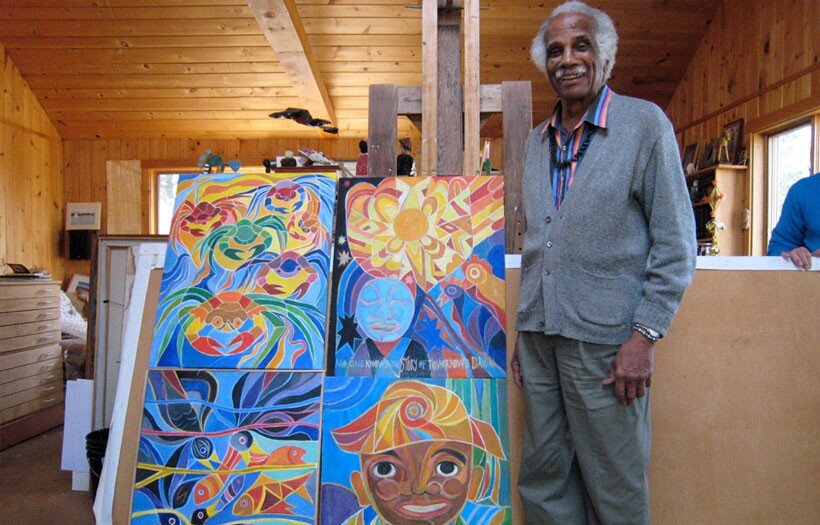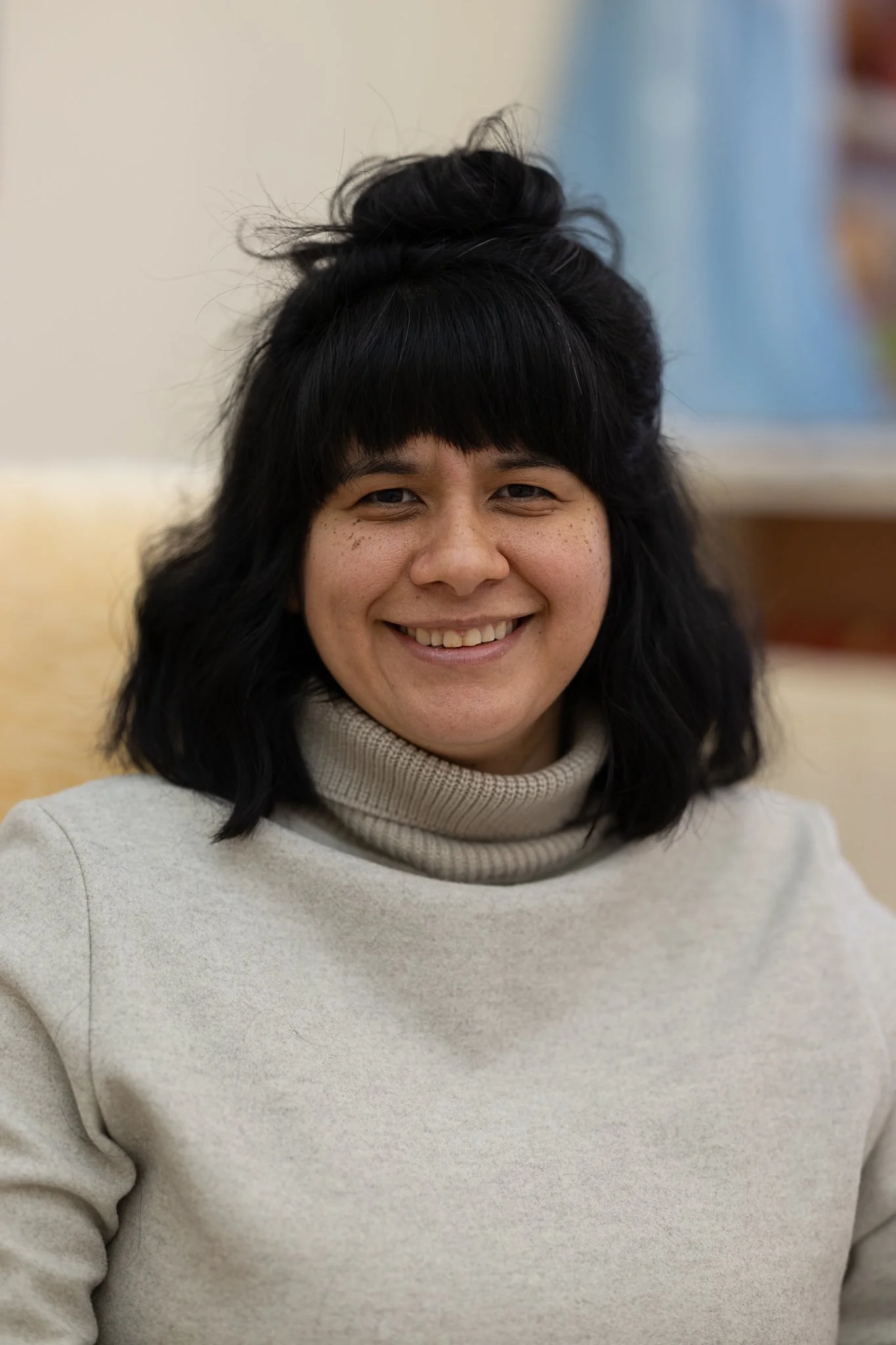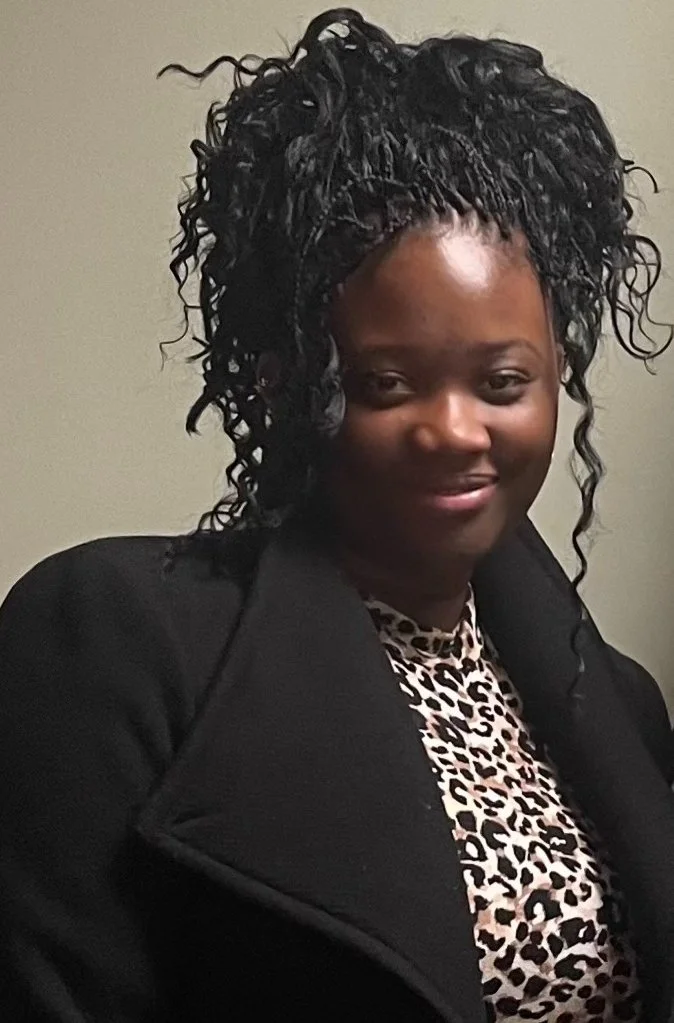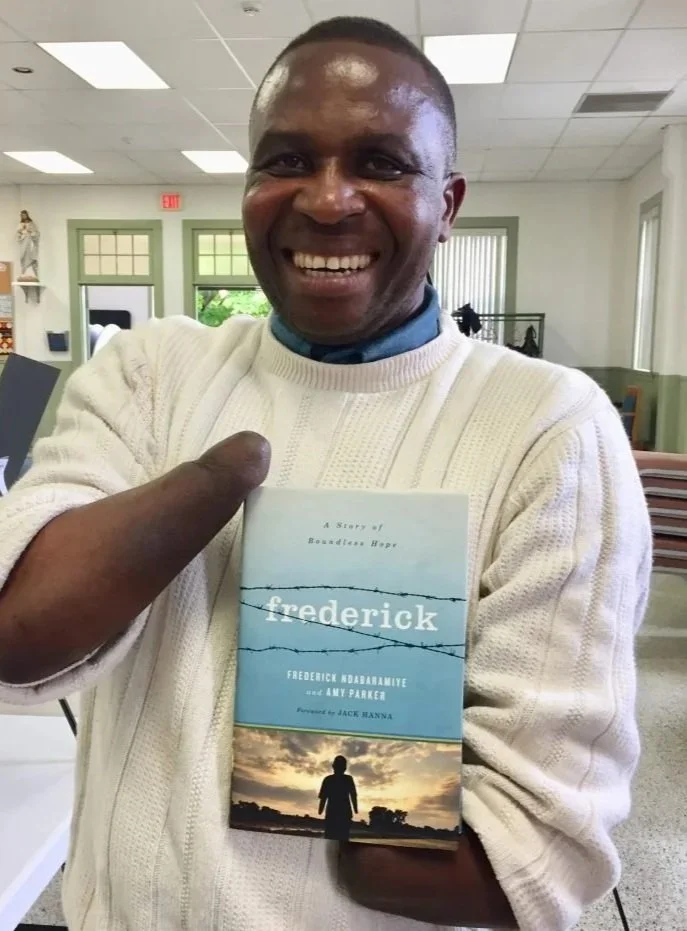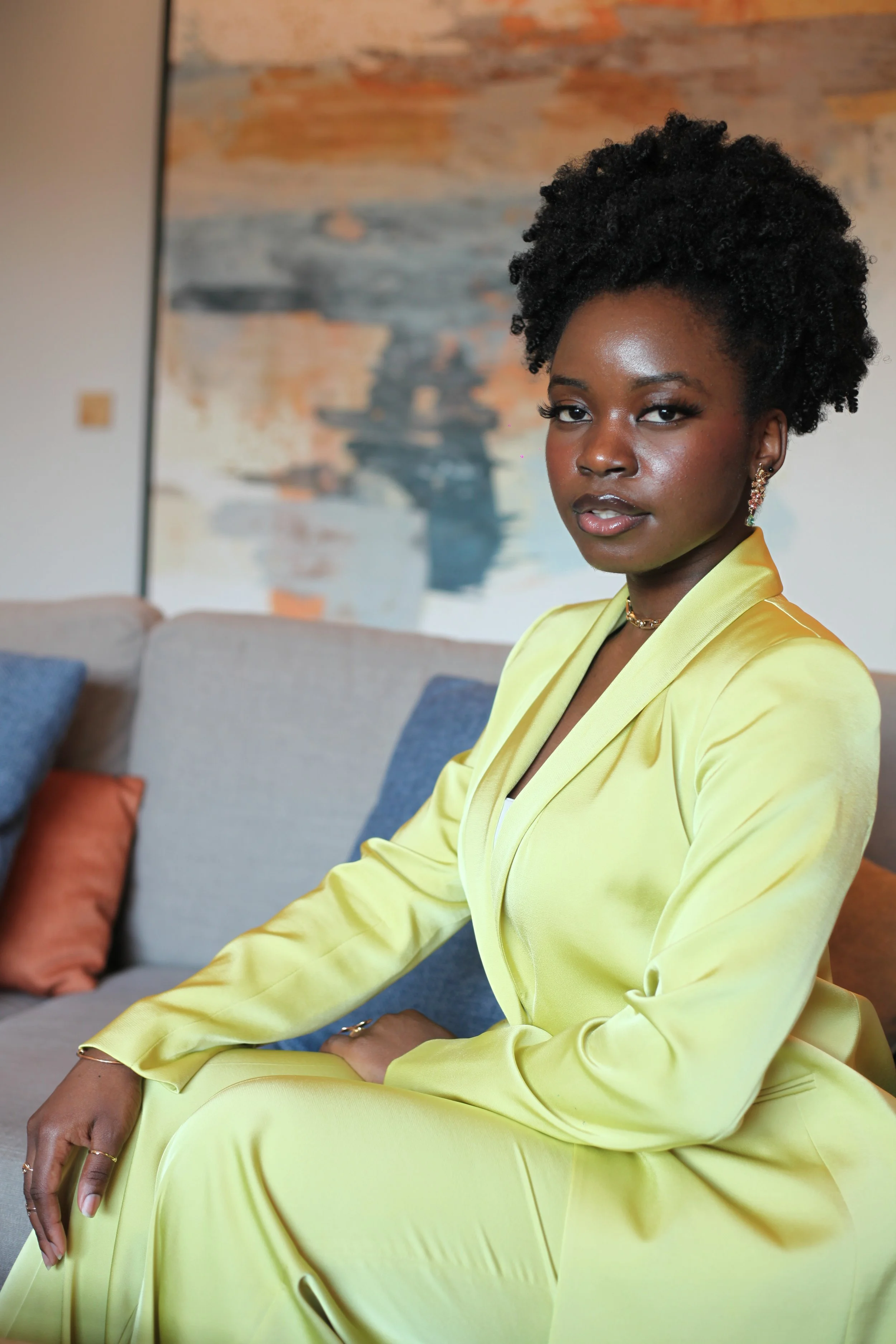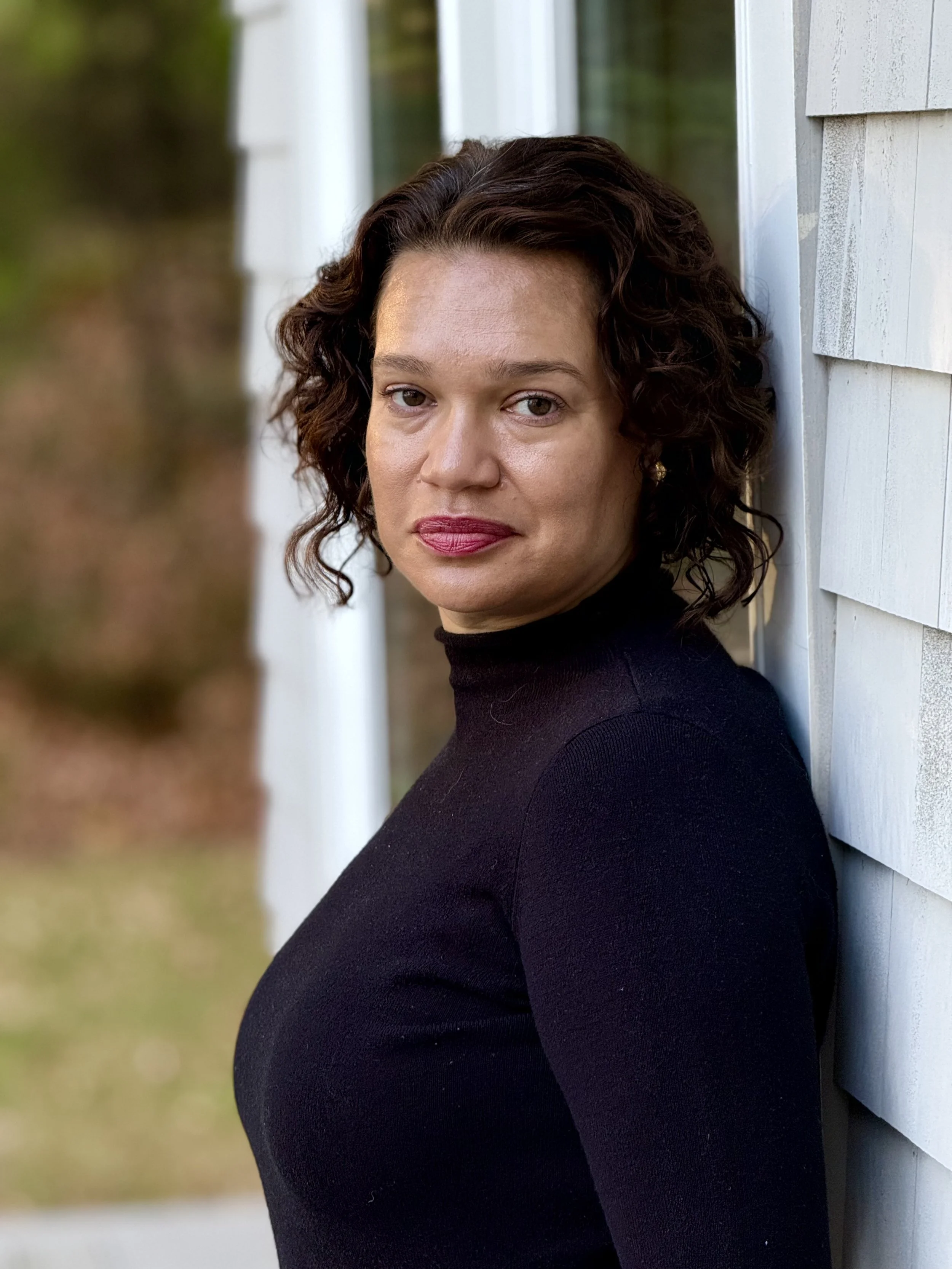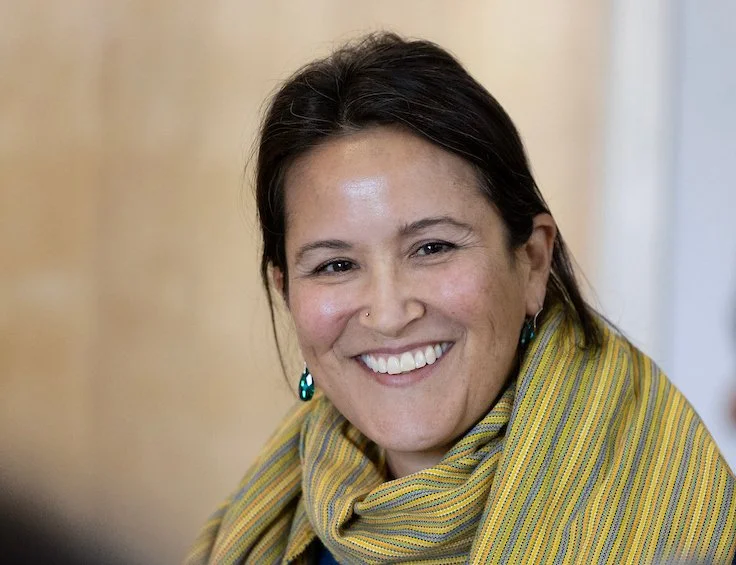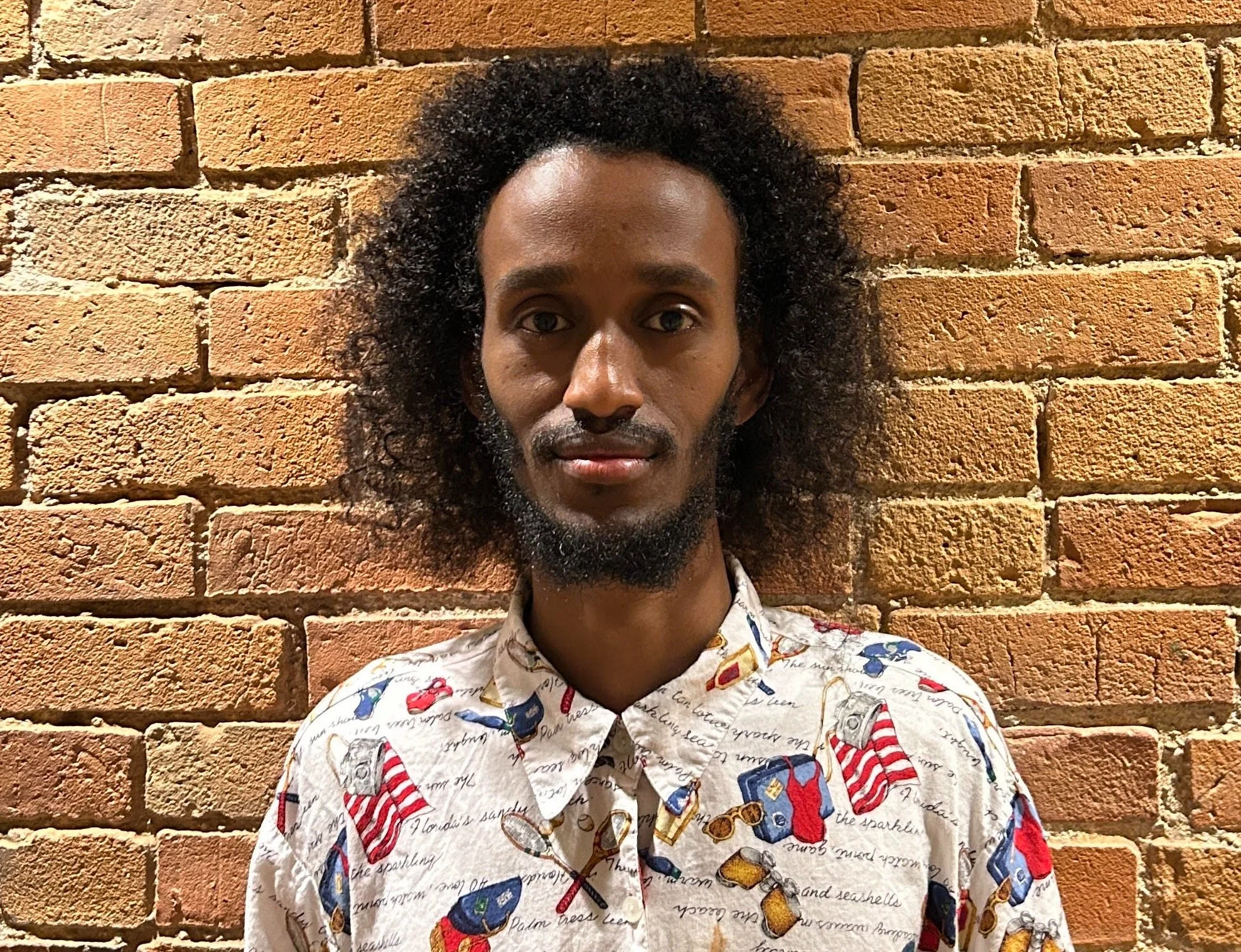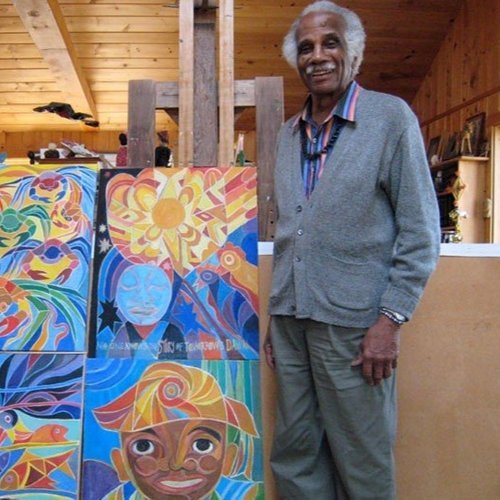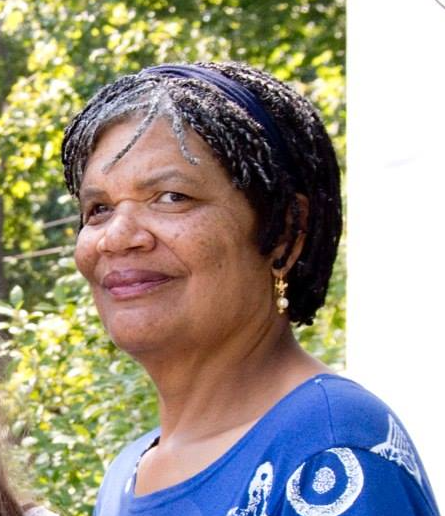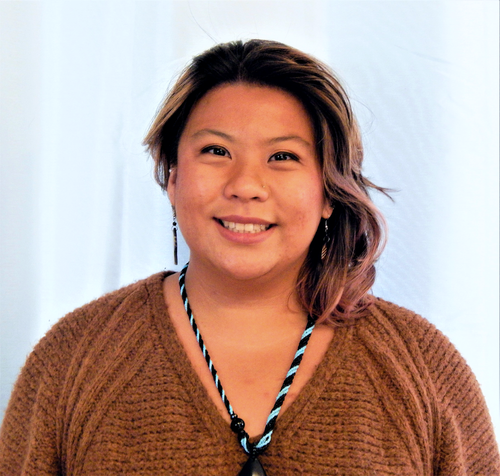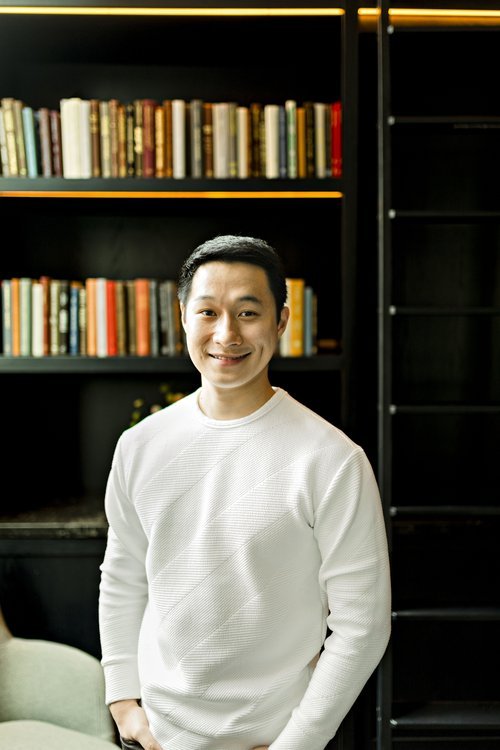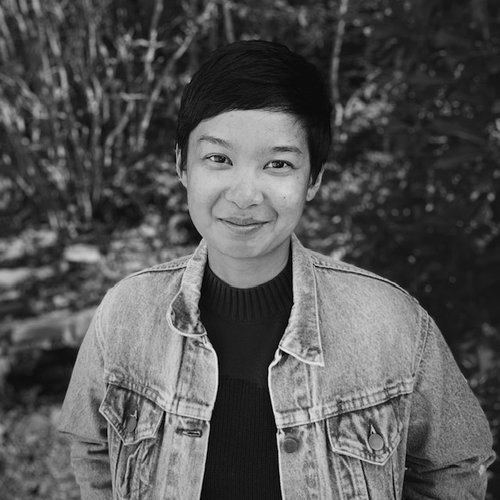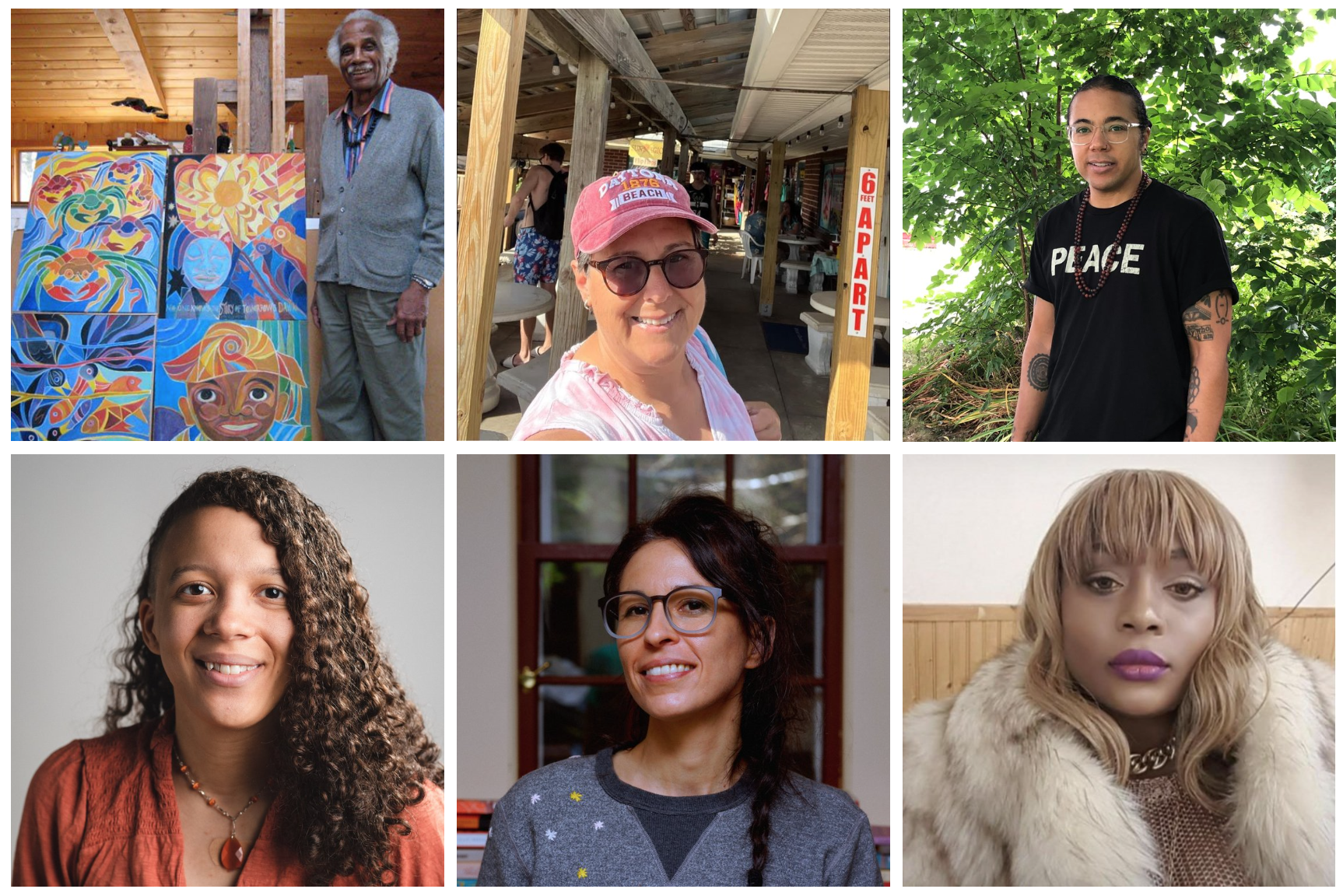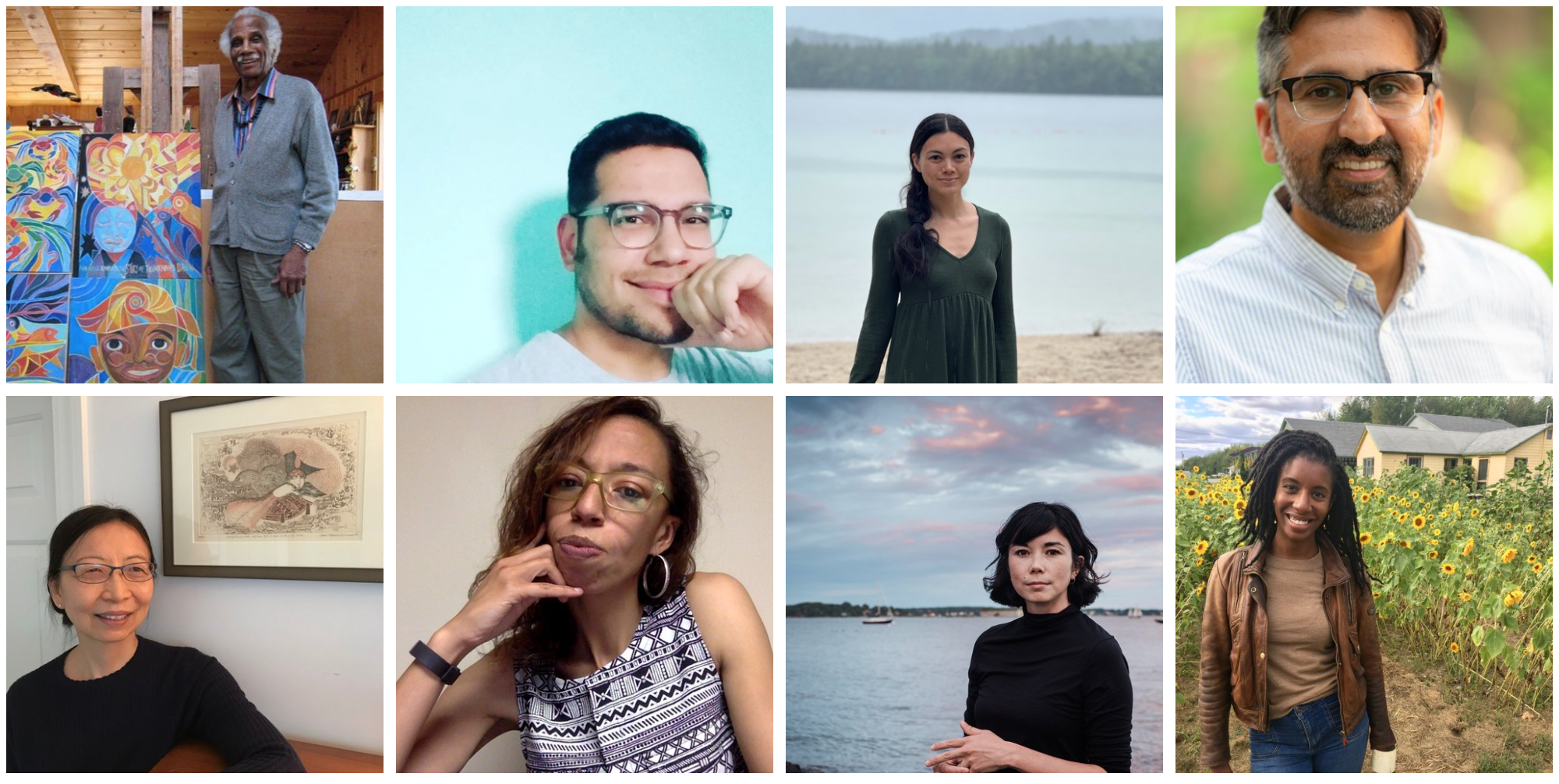The Ashley Bryan Fellowships
In honor of award-winning writer and artist Ashley Bryan’s life, the MWPA is pleased to offer the Ashley Bryan Fellowships, which support emerging Maine writers who face significant barriers to traditionally exclusive, professional literary spaces. Bryan Fellows receive free membership, workshops and other support—you will find full guidelines, application details, and backgound info below. In collaboration with all of the 2021 Ashley Bryan Fellows, Coco McCracken writes the following about the fellowship:
Ashley Bryan Fellows are invited to hone their literary craft and build community in safe spaces. Whether addressing relevant social themes in our work or in conversation with one another, this Fellowship is designed to break down barriers that have impacted marginalized communities in Maine. We do so by honoring each other’s work, making space for authentic truth-telling, and calling one another in rather than calling out in order to repair harm when necessary. Through these means, we are building a network of mutual support to bolster each member’s creative and professional goals. Until our literary world provides equal access to opportunity for historically excluded writers, this group sees the Ashley Bryan Fellowship as an opportunity to build stronger connections and to acknowledge and celebrate literary ingenuity within our vibrant, multifaceted communities.
“I love to celebrate the artistry of people around the world in whatever material or form they work” --Ashley Bryan
The Bryan Fellowships are open to applications from September 11 to October 31 and nominations from September 11 to October 17.
If you have any questions, please contact MWPA’s Samara Cole Doyon at samara@mainewriters.org.
2025 Ashley Bryan Fellows
The 2025 Bryan Fellows include (below, clockwise from left to right): Teacher and community organizer Joana Elizabeth Chacón de Entwisle; writer and political science scholar Sophia Kapita; religious studies scholar, poet, and fiction writer Angel McCorkle; artist, speaker, and author Frederick Ndabaramiye (photo credit: Dhananji Rathnayake of Amjambo Africa); poet and author Sabrine Nibamwe; multi-genre writer and NYU and MIT Sloan graduate Annalise Parham; novelist and Bates College professor Clarisa Pérez-Armendáriz (photo credit: Bates College Communications Office); poet and English scholar Omar Yusuf. A full bio for each Ashley Bryan Fellow appears below.
Joana Elizabeth Chacón de Entwisle is a Pipil Salvadoran-American teacher and community organizer. Her parents left El Salvador as teenagers to escape the Salvadoran Civil War. She grew up in a Hispanic neighborhood in Seattle and became a high school English teacher. During the pandemic, she co-founded the nonprofit Educators for Antiracism, which hosted a virtual conference, attended during the first year by teachers in 22 countries and in all 50 U.S. states. She co-directed the nonprofit for three years while still teaching high school. Since having children, she has moved to Maine, where she devotes her time to raising her children and organizing within the local Hispanic community. She DJs for WERU on their Sabor Latino show, co-moderates the largest social media group for Latinos in Maine, and helps lead a Spanish immersion story hour at her local library. Joana is an aspiring bilingual children’s book writer.
Sophia Kapita is a writer and political science student based in Portland, Maine. A Michael Macklin Fellow at The Telling Room and a Maine NEW Leadership alum, her work explores identity, displacement, and the challenges and resilience of Black womanhood. She is currently pursuing her Associate’s degree at Southern Maine Community College and developing a collection of poems about migration and belonging.
Angel McCorkle is a Black, queer, non-binary poet and fiction writer currently based in Maine. She is a student at St. Joseph's College studying religious studies in preparation for chaplaincy work. She brings an intersectional lens to her writing, exploring themes of bodily autonomy, chronic illness, marginalization, and the search for belonging.
Frederick Ndabaramiye is a Rwandan artist, speaker, and author. In 1994, when he was a boy, his country was in the midst of a genocide in which more than one million Rwandans lost their lives. Three years later, as a result of post-genocide violence, he lost his hands in an unprovoked machete attack, but he survived. He spent the next several years in the Imbabazi Orphanage, which would eventually provide life-changing opportunities. As a part of his recovery, he was forced to re-learn even the most basic life skills. He had to learn to feed, bathe and dress himself without hands. He was determined to overcome all of these challenges so that he could live as independently as possible. Now an accomplished artist, he has shared his artwork around the world. During his years in the orphanage, along with his friend and former teacher, he began dreaming of opening a school to help children with disabilities. With the support of Jack Hanna and the “Partners in Conservation" program at the Columbus Zoo, that dream became a reality. In 2008, they opened the Ubumwe Community Center, in the town of Gisenyi, Rwanda. In 2014, he wrote a book titled Frederick: A Story of Boundless Hope, sharing his story and the roles faith, hope, forgiveness and art have played in his life and healing. He has chosen to devote his life to helping others.
Sabrine Nibamwe is a poet, writer, and published author of two poetry collections: her debut collection, I will tell my son, and slay, your highness, which reached #1 in all three of its Amazon categories. She was born and raised in Rwanda. Sabrine extends her support to others in many ways through her writings and healthcare services. She strongly believes that embracing individual differences is a way to promote understanding, and her writing caries the enchantment of the written WORD. The power of her phrase “Everyone has their own story” and the determination to exchange with others through her personal experiences, allows Sabrine the opportunity to deliver her poetry with passion and inner faithfulness. Within the topics of intrinsic expression, she finds herself most writing about life, love, feminism, resilience, inner power and peace, though she enjoys exploring diverse subjects. Embracing the meaning of her last name, Sabrine promotes within her writings the universal similarities among humans. Sabrine started sharing her words as a way to pave a path for those behind her and ended up finding a wellspring of raw creativity and deep solace. She currently lives and writes in Maine.
Annelise Parham is a daughter, sister, spouse, mother, and writer of African-American, German, and Irish descent. She writes as she lives, at the intersection of race, class, and culture; at the overlap of poetry and prose, fiction and memoir, remembered song lyrics and forgotten corporate memos. Annelise holds a bachelor’s degree in cultural anthropology from NYU and a master’s degree in business from MIT Sloan. She shifted to full-time writing in 2023 after leaving a decade-long career in corporate biotech. Annelise is a student of The Writers Studio and the 2025-26 GrubStreet’s Memoir Incubator program. In 2025 Annelise received the Maine Writers & Publishers Alliance Ilgenfritz and Christina Baker Kline Scholarships. After a lifetime spent searching for a place that feels like home, Annelise has happily settled in Maine’s Midcoast with her husband, two kids, and the family Collie.
Clarisa Pérez-Armendáriz was born in Monterey, Mexico, grew up in Colorado, and completed her undergraduate and graduate studies in California, Massachusetts, and Texas. Her first "real" job was with the United States Foreign Service, and her first "overseas" assignment in Mexico City. The experience was transformative, and is the inspiration for the literary novel she hopes to complete as an Ashley Bryan Fellow. Clarisa moved to Maine in 2009 to work at Bates College. Her research examines the impact of emigration on the politics of communities that are "left behind." She teaches Latin American politics, Latino politics, and international migration and is also founding a member of the College's Latin American and Latinx Studies Program. Clarisa has received recognition for her teaching and mentoring, including a national award for mentoring Latino undergraduates. She's been a writer since she was a kid, but it's only in the past five years that she's convinced herself that some stories about politics and immigration are better told through fiction than through scholarly work.
Omar Yusuf, a first generation Somali immigrant and current resident of Westbrook, is a long time poet and writer, drawing inspiration from the natural beauty of Maine to tell stories of generational and religious trauma through intersectional poems that breathe new life into what it means to heal and move forward. Omar has been published through The Telling Room’s Young Writers and Leaders and Publishing Workshop programs. He is currently pursuing a BA in English. With dreams of sustaining Maine’s landscapes and an interest in natural conservation, he volunteers with the Presumpscot Regional Land Trust and is an avid hiker of Maine’s trails. Omar is always on the lookout for the best way to be involved with his community and hopes to find a more permanent means of helping those around him.
2024 Ashley Bryan Fellows
The 2024 Bryan Fellows include (below, clockwise from left to right): immigrant leader and writer Mufalo Chitam; organizer, activist, strategist, and writer Jenna Dela Cruz Vendil; queer, non-binary, second-generation Filipinx American writer and activist Jinky (Jenesha) de Rivera; Citizen Arist and performer Brian J. Evans; and poet and writer Alexis Raymond. A full bio for each Ashley Bryan Fellow appears below.
Mufalo Chitam—Civic-minded, understanding, generous, and thoughtful, Mufalo is gifted with a tremendous ability to relate across all ethnic communities no matter how different their experiences or needs may be. As an immigrant community leader representing 100+ members and partner organizations, including immigrant constituency and advocacy groups as well as direct service and grassroots community organizations. Most recently, she was recognized as Spurwink’s 2023 Humanitarian of the Year and 2022 Maine Biz Women to Watch honoree for her work as an immigrant advocacy leader at Maine Immigrants’ Rights Coalition (MIRC). Mufalo works to elevate the voices of new Mainers as they find their way and cultivate a more diverse and inclusive Maine for future generations of immigrant children to come.
Jenna Dela Cruz Vendil is an award-winning organizer, activist, and engagement strategist who works to build inclusive systems through social action, policy, and electoral engagement. For nearly 15 years, Jenna supported youth and student engagement within political and social movements in Maine, ranging from educational equity for BIPOC youth in Portland, to reproductive health, tax fairness and worker justice. In 2009, Jenna became the first Asian American woman elected in Portland, serving on the School Board for nearly a decade to advance educational equity, strengthen student voice, and increase diverse community engagement. Jenna currently works for Bates College, facilitating experiential opportunities for students to step into their power, on their journey for social change. Jenna started writing stories as a child, as a means for conveying dreams of different realities. In high school and college, writing became the space to explore experiences from childhood - homelessness, Catholicism, Filipino culture, and fractures in family, as a way to interrogate the narrative and myth of the “American dream.” It became a refuge amidst historical conflict, war, and trauma from a childhood that seems better left forgotten. After an 18-year hiatus, Jenna was called back to writing in 2024, following the birth of her second child and the deaths of two formative mentors. She is writing to liberate memory, disrupt cultural norms, and to pay homage to the tricksters. It is now the place of connection for grief, joy, the non sequiturs, a portal to the multiverse of histories and possibilities for transformation and liberation.
Jinky de Rivera is a queer, non-binary, second-generation Filipinx American writer and activist, and they are the co-editor of Homelands: Women’s Journeys Across Race, Place, and Time (Seal Press, 2006), with additional writing featured in Waking Up American: Coming of Age Biculturally (Seal Press, 2005). Their short plays have been staged at Bindlestiff Studio, a Filipino American performing arts theater in San Francisco, and showcased in 3GirlsTheatre Company’s New Works Festival. They earned an MFA in Creative Writing from Mills College in Oakland, California, and are currently working on a genre-bending, time-traveling family drama. Jinky currently lives in Lewiston and works at Thousand Currents, a public foundation leveraging relationships and resources worldwide to movements working on climate, food and economic justice.
Brian J. Evans is a Citizen Artist, defined by the Aspen Institute Arts Program as “Individuals who reimagine the traditional notions of art-making, and who contribute to society either through the transformative power of their artistic abilities, or through proactive social engagement with the arts in realms including education, community building, diplomacy and healthcare.” Mixing disciplines, mixing professions, and mixed race, Brian J. Evans unpacks the “moments of suspension” that reside in the spaces between spaces—convinced that connections exist between us all and it is the responsibility of the Arts to remind us to be holistically human, lest we forget. Courageous vulnerability and intentional equity keep him aloft as he finds ways to give back and add to the communities, mentors, and ancestors who blazed trails and continue to do so! Evans believes it is the responsibility of the Arts to rediscover existing connections within humanity.
Alexis Raymond is a poet who writes to honor the minority experience in predominantly white spaces. As a Black woman growing up in Maine she now aims to spread awareness and foster community by sharing stories. With aspirations of making English more accessible and reclaiming the language from its colonial roots, these dreams are reflected in the language, form, and themes of her poetry; Themes such as slavery, stereotype threat, Black mother mortality rate, over policing, anger, and hope. She hopes to create a safe passage for all people and emotions that engage with her work. A Stonecoast MFA graduate, she is also a journalist and a published short-story fiction writer. Her work has been featured in Portland Monthly Magazine, The Elevation Review, So to Speak Journal, Moonstone Arts’ Fatal Force Anthology, Vaum Magazine, and Hellbender Magazine.
2023 Ashley Bryan Fellows
The 2023 Bryan Fellows include (below, clockwise from left to right, after Ashley Bryan himself) educator, writer, and performer Linda Ashe-Ford, artist, writer, and community organizer Dania Bowie, writer and graphic designer Kendric Chua, writer, mother, and boat captain Minquansis Sapiel, and poet and community organizer Stacey Tran.
Linda Ashe-Ford is a veteran in the early education field and was a classroom teacher for over 45 years. She is a past president of the Maine Association for the Education of Young Children as well as a past treasurer of the New England Association for the Education Of Young Children. Linda holds a Master in Education from Antioch New England Graduate School and a BA in Theater and Communications from the University of Hartford. Using her background in theater, she has written, produced and performed both original and scripted materials on various topics. Linda is a storyteller who brings the history and folktales of people of color to life. She believes that through story we can begin to deepen our understanding of each other.
Dania Bowie (she/they) is an artist, as well as a resource and community organizer who works to move resources and people power to address systems-level change through civic and political education in Maine. They are first-generation Filipinx American, queer, and a learning abolitionist. Their art—from fiction writing to painting—seeks to connect people, but also complicate the narrative of resilience in immigrant families. Their focus is on the Filipinx diaspora and the consequences of living global lives as previously colonized people.
Growing up gay in a community with strong Catholic roots on the northernmost island of the Philippines, Kendric Chua spent most of his childhood in his imagination and within the fictional worlds of others, like Stephen King, to inoculate himself from an abusive household. Kendric emigrated to the United States when he was fifteen and earned his BFA in Visual Effects from the Savannah College of Art and Design. He now proudly calls Maine home and volunteers his design skills to benefit non-profit organizations. He has finished the first draft of his first novel and written several short stories, most of which are set in Maine. Kendric is currently being coached by Maine novelist and transgender activist, Alex Myers.
Minquansis Sapiel is a Passamaquoddy TribaI member, mother of three daughters and has a Masters in Social Work. Her daughter also illustrated the children’s book she wrote Little People of the Dawn. She grew up on the Sipayik Reservation and moved off to go to college at the University of Maine. She also has her Captain’s license and offers whale watching tours.
Stacey Tran (she/they) is a community organizer, author of Soap for the Dogs (Gramma, 2018), and creator of Tender Table, a project celebrating Black and Brown community by connecting and honoring our identities, traditions, joy, resilience, and fight for collective liberation through storytelling and food.
2022 Ashley Bryan Fellows
The 2022 Bryan Fellows include (below, clockwise from left to right, after Ashley Bryan himself) musician, writer, tutor, and translator Wendy Newell Dyer, Ian-Khara Ellasante, Michelle Kazaka, Leila Nadir, and Maya Williams. A full bio for each Ashley Bryan Fellow appears below.
Wendy Newell Dyer is a citizen of the Passamaquoddy Nation. Put into the Maine child welfare system at birth and later adopted, she searched for and found her biological parents when she was twenty-five and began her journey to come to know herself as a Passamaquoddy woman. In the past thirty-three years she has fully immersed herself in cultural teachings, practices and ceremonies. She graduated from the University of Maine at Machias in 2003. She was a freelance writer/photographer for the Downeast Coastal Press and the Machias Valley News Observer where she covered a variety of topics including the Maine High School Basketball Tournaments. Widowed at forty-two, Wendy helped write educational materials for the Maine Coalition to Fight Prostate Cancer, and won a national writing contest sponsored by the Prostate Cancer Foundation and judged by actress Kristin Bell. Her story "A Warrior's Homecoming" appeared in "Dawnland Voices: An Anthology of Indigenous Writers from New England in 2014." Several of her stories have been published in the online literary magazine Dawnland Voices 2.0, two Chicken Soup for the Soul books and in Homeschooling Today magazine. As an adoptee, Wendy testified before the Maine Truth and Reconciliation Commission in 2015. She recently shared her adoption story on WERU's Dawnland Signals. Newell Dyer was one of the recent winners of the Maine Writers & Publishers Alliance Call for Native Writers. She works for Wayfinder Schools as the Passages teacher for Washington County. She has three sons, four grandsons and a black lab Jack.
Ian-Khara Ellasante (they/them) is a Black, queer, trans-nonbinary poet and cultural studies scholar. Ian-Khara has published poems in We Want It All: An Anthology of Radical Trans Poetics, The Feminist Wire, The Volta, Hinchas de Poesía, Nat. Brut, and Writing the Land, and has been honored with the New Millennium Award for Poetry. Their critical writing has appeared in Transgender Studies Quarterly, Ethnic and Racial Studies, and elsewhere. Proudly hailing from Memphis, Ian-Khara has also loved living and writing in Tucson, Brooklyn, and most recently, in southern Maine, where they are an assistant professor of gender and sexuality studies at Bates College.
I am Michelle Kazaka, Born in 1977 in the capital of the Republic Democratic of Congo . At the age of sixteen, the injustice and inequality that I endured changed everything. Understanding that for me to manage the seed, the problem of the root should be resolved, I devote myself completely in the activism of the rights claim that leads me to get closer to the source of the problem and thus to understand what was wrong. And this knowledge, which inflames my enthusiasm to continue what I defined as a noble struggle, was defined for those who took advantage of it as a threat. And it was to eliminate this movement of young people who grew up drastically, the authorities used means increasingly hard and harsh with regard to its young for whom, the only sin was their rights and benefits that they granted them. The xenophobia chasm I endured while passing through various African countries, made the life more sour and repressions on and made our stay more and more difficult to hold, until the day thanks in the lottery American known as "DV LOTTERY" allowed us to travel to the United States, always in search of peace because of the noise that the claim of justice can create and the safety of their lives. And above all, raising awareness of more important international nations about the hardships that young people face, who, as they stand up for their rights, flout.
A mother of 3, a new Mainer for about 5 years and in my spare time, a storyteller/writer. My passion for storytelling already existed when I was just 5 years old, gathering my siblings and the rest of my family around the big mango tree in our backyard almost every night. I then graduated from a local University in Kinshasa with a degree in Journalism, where my passion for writing stemmed from.
Being born in Kinshasa, DRC, passing through various African countries throughout the course of my life and eventually finding myself in Maine gave me quite the unique experience- or so thought. Coming here, I found so many other people who shared similar experiences with me, making me feel heard and belonged for the first time in my life.
This is why I wrote my book, ‘How Long The Night’, to provide a voice, a perspective from all immigrants who found themselves in Maine after a long journey that lasted almost their entire lives. This book is a memoir that reflects my story, in which some will learn from and some will relate to.
Leila Christine Nadir is an award-winning Afghan-American artist, writer, and educator exploring life after ruins and the possibilities for collective memory and repair amidst ecological disruptions, childhood violence, immigration and exile, and colonial traumas. Her writing has appeared in literary, scholarly, and popular venues, including Black Warrior Review, North American Review, Asian American Literary Review, ASAP, Aster(ix), and Hyperallergic, and has been anthologized in 2021's New Moons: Contemporary Writing by North American Muslims, edited by Kazim Ali. With poet Zohra Saed, she has co-edited a special collection of Afghan-American writing for Asian American Literary Review. Her book project, Afghan Americana: An Intimate-Geopolitical memoir, is supported in 2022-2023 by a MacDowell Fellowship, Hedgebrook Residency, and Aspen Institute Emerging Writer Fellowship. She holds a PhD in English from Columbia University.
Maya Williams (ey/they/she) is a religious Black multiracial nonbinary suicide survivor who is currently the seventh poet laureate of Portland, ME from July 2021 to July 2024. Ey has published poems in venues such as The Portland Press Herald, The Cortland Review, FreezeRay, Indianapolis Review, Occulum, glitterMOB, Littoral Books, Black Table Arts, and more. Their debut poetry collection Judas & Suicide will be published May 2023, and their second collection Refused a Second Date will be published October 2023. She has received residencies from organizations such as Sundress Academy for the Arts (SAFTA), Voices of Our Nation Arts (VONA) Foundation, The For Us by Us Fund’s Words of Fire Retreat, Hewnoaks Artist Colony, and The Watering Hole. Maya was one of three artists of color selected to represent Maine in The Kennedy Center’s Arts Across America series in 2020, and was listed as one of The Advocate’s Champions of Pride in 2022. Maya also serves as MaineTransNet's Community Care Program Coordinator, where they develop peer support groups for trans survivors, develop educational material on trauma informed trans competency for advocates, provide outreach to incarcerated trans folks, and develop arts programming. Follow more of eir work, and invite em to read or facilitate a workshop, at mayawilliamspoet.com.
2021 Ashley Bryan Fellows
The 2021 Bryan Fellows include (below, clockwise from left to right, after Ashley Bryan himself) musician, writer, tutor, and translator Johan Alexander Fenney, who grew up in Belfast and lives in Portland; writer and copywriter Liz Iverson, who lives in Portland; writer and podcaster Zahir Janmohamed, who is a Visiting Assistant Professor of English at Bowdoin College; writer and social worker Ariele Le Grand who lives on Mount Desert Island; writer, mother, and Portland resident Coco McCracken; writer, playwright, mother, and Portland native Christina Richardson; and scholar, data analyst, research consultant, and writer Ning Sullivan, who grew up in Mainland China and has lived in Wells for twenty-two years. A full bio for each Ashley Bryan Fellow appears below.
Johan Alexander Fenney is a musician, tutor, and translator based in Portland, Maine. Born in Medellin, Colombia, and adopted at 18 months, he grew up in and around Belfast, Maine. After spending years abroad in South America and subsequently returning to Maine, he currently spends a few months every year in his birth country teaching ESL.
Zahir Janmohamed is a Visiting Assistant Professor of English at Bowdoin College. He received his MFA in fiction at the University of Michigan where he received awards in fiction, nonfiction, poetry, and playwriting. In 2019, the podcast he co-founded, Racist Sandwich, was nominated for a James Beard Award.
Liz Iversen was born in the Philippines and grew up in South Dakota. Her writing has appeared or is forthcoming in Creative Nonfiction, Passages North, Room, and J Journal: New Writing on Justice. She has received support from Tin House and the Maine Writers and Publishers Alliance. Currently based in Portland, Maine, she is a copywriter for a radio and podcast advertising agency. You can find her online at liziversen.com.
Ariele Le Grand is a first generation American/Brooklyn-born black woman. She is a writer and social worker living on Mount Desert Island with her partner and their tree climbing dog. Ms. Le Grand’s first story was recently published in Split Lip Magazine. Her work was also selected as a finalist in the 2019 – 2020 Tennessee Williams & New Orleans Literary Festival Fiction Contest. Ms. Le Grand received her MFA last spring from Temple University, where she also taught fiction and first year writing.
Born into a mixed-race family in Toronto, Coco McCracken has always been interested in writing about the intersectionality of place, race, and identity. With mystery shrouding her ancestry, her work is equal parts detective work and rhetorical relief, which comes from examining what it means to be a half-Asian, half-white woman, today. Now, raising a young daughter in Maine she embarks on her new immigrant identity as half-Canadian, half-American. Coco currently has a newsletter called Coco’s Echo, writes a monthly column for Amjambo Africa, and is working on her first memoir.
Christina Richardson is a Black-identified mixed race Portland native with a love for community, equity, creativity, and the little things. Spending as much time as she can with her daughter, Laila, she also works as a Supervisor at the Portland Public Library. She was a Team Member for the 2020’s Beautiful Blackbird Children’s Book Festival, a co-playwright for Bare Portland’s ‘Storage’, and has served positions for Mayo Street Arts and The For Us, By Us Fund, was a Committee Member for The City of Portland MLK Task Force, and has held many other positions within the Greater Portland Community.
Ning Sullivan was born and grew up in a turbulent time in Mainland China. She taught political economics and philosophy at college and graduate school level. In 1993, at age 35, she left China for Sweden as a visiting scholar. She later came to the United States to pursue an advanced degree in Applied Sociology and Research Methods. She taught statistics, worked as a data analyst and research consultant, and published research papers on Asian American mental health. In May 2021, she was invited to participate a reading at a Cultural Event sponsored by Boston Major’s Office: Emerging Writers from Grubstreet: A Reading and Conversation Hosted by Artist Fellow Shubha Sunder. Her short story Mizugiwa will be published in an upcoming issue of Massachusetts Review. She lives in Wells, with her husband of 22 years.
General Guidelines
The Ashley Bryan Fellowships are open to Maine residents (1) who have published no more than one, full-length book (excluding self-published or community-published titles amounting to less than 500 copies in circulation), (2) who are 18 years of age or older at the time of the application, and (3) who face significant barriers to traditionally exclusive, professional literary spaces. Both full-time and part-time Maine residents are eligible to apply (including part-time, seasonal residents who grew up in Maine and have a regular presence in the state and/or those who own a second home in the state).
The fellowships are open to writers in all genres.
There is no fee to apply.
Whether nominated or self-nominating, all prospective fellows must submit an application, which includes a statement of purpose and work sample—see details at the application link below.
Eligible writers can be nominated by writers, teachers, or librarians around the state or can nominate themselves. Any writer who is nominated will be alerted to their nomination and asked to apply. Nominators, please see the nomination link below.
Fine Print
Each Bryan Fellow will receive the following:
A five-year Find Maine Writers Membership, valued at $275, which entitles the fellow to the following benefits:
A profile on Find Maine Writers, a website dedicated to profiling Maine’s many diverse and talented writers, publicizing their work and accomplishments, and connecting them with readers, editors, literary agents, publishers, and potential employers
Member Workshop & Conference Discounts & Scholarships
MWPA’s weekly literary news & events newsletter, the Peavey
Eligibility to apply for MWPA member opportunities like the Monson Residency
Two free short-term (less than five weeks) workshops per year or one free long-term workshop per year (an estimated $250-$500 value/per year)
Opportunities to connect and confer with other Bryan Fellows and with established and award-winning Maine writers
History + Background of the Ashley Bryan Fellowship
In 2017, MWPA awarded Ashley Bryan its Distinguished Achievement Award for exceptional and steadfast contributions to the Maine literary arts. Bryan published more than fifty books in his lifetime, and many of them have been groundbreaking. Among Bryan’s other awards are the Coretta Scott King–Virginia Hamilton Lifetime Achievement Award, Laura Ingalls Wilder Medal, and the New York Public Library’s Literary Lions award. Ashley Bryan died in 2022, and it is our hope that the Ashley Bryan Fellowships will continue his legacy by offering support, encouragement, and connection to talented Maine writers.
In 2021, MWPA gave out the first 7 Ashley Bryan Fellowships to emerging writers who were either nominated by writers, teachers, or librarians around the state or nominated themselves. Two award-winning writers of color acted as the jurors. In 2022 and in each year to follow, MWPA hopes to give 5 Bryan Fellowships through an open application process with a subset of the current fellows and/or Community Advisory Board members acting as jurors.
We thank writer Stephanie Cotsirilos for the original matching support to establish the Ashley Bryan Fellowship, as well as to the other MWPA donors who help make this fellowship possible. If you wish to contribute to this fund, please click on the donate button below or contact Gibson Fay-LeBlanc at director@mainewriters.org.
MWPA hopes to add more opportunities for mentorship, support, and community for Bryan Fellows in the years to come. This fellowship is one of a series of efforts to help make Maine’s writing community more diverse, equitable, and inclusive. You can read MWPA’s Statement on Diversity, Equity, and Inclusion here.
Donate
If you would like to honor Ashley Bryan and support Maine writers who are BIPOC, please make a tax-deductible donation by clicking the button below and note that you wish to support the Bryan Fellowship.

